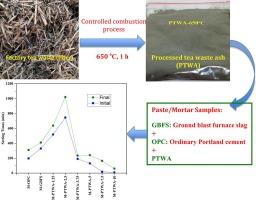Influence of processed tea waste ash on the hydration products and mechanical property of hybrid cement as an eco-friendly solution
IF 7.1
2区 环境科学与生态学
Q1 ENGINEERING, ENVIRONMENTAL
引用次数: 0
Abstract
The waste generated during production in tea factories is increasing with the growth of the world population. Storage of tea waste creates problems in terms of location and environment. The aim of this study was to investigate the usability of tea waste ash in hybrid concrete to re-introduce tea waste into the economy and turn it into a useful material in the construction industry. Therefore, processed tea waste ash (PTWA) was first burned in an uncontrolled and then burned in a controlled combustion process at 650 °C. In the hybrid cement design, ground blast furnace slag was kept constant at 50 %, and PTWA was replaced with ordinary Portland cement at 0 %, 1.25 %, 2.5 %, 3.75 %, 5 %, 7.5 %, and 10 % by weight of the total binder (GBFS + OPC + PTWA). Experiments for pastes and mortars were performed for 2, 7, 28, and 90 days. Mineralogical properties (XRD, FTIR, TGA/DTA) of the paste samples were analyzed. Mechanical tests (compressive strength, initial/final setting time, flow table, leaching) were carried out on mortar samples. The results revealed that initial and final setting times (up to 10 min and 60 min, respectively) decreased significantly as the amount of PTWA substitution increased. The performance of the mortars with PTWA was observed to diminish compared to the reference for each cure age. It was determined that PTWA affected the reduction of portlandite, and this was observed most in mixtures containing 10 % PTWA. It is believed that using PTWA together with GBFS as an alkaline activator will be beneficial to the environment.

经加工的茶叶废灰作为一种生态友好型解决方案对混合水泥水化产物和机械性能的影响。
随着世界人口的增长,茶厂在生产过程中产生的废物也在不断增加。茶叶废料的储存带来了地点和环境方面的问题。本研究的目的是调查茶叶废灰在混合混凝土中的可用性,将茶叶废料重新引入经济领域,使其成为建筑行业的有用材料。因此,加工过的茶叶废灰(PTWA)首先在不受控的情况下燃烧,然后在 650 °C 的受控燃烧过程中燃烧。在混合水泥设计中,磨细高炉矿渣的比例保持不变,为 50%,用普通硅酸盐水泥取代 PTWA,占总粘合剂(GBFS + OPC + PTWA)重量的比例分别为 0%、1.25%、2.5%、3.75%、5%、7.5% 和 10%。浆料和灰泥的实验分别进行了 2 天、7 天、28 天和 90 天。分析了浆糊样品的矿物学特性(XRD、傅立叶变换红外光谱、TGA/DTA)。对灰泥样品进行了机械测试(抗压强度、初凝/终凝时间、流动表、浸出)。结果表明,随着 PTWA 替代量的增加,初凝时间和终凝时间(分别为 10 分钟和 60 分钟)明显缩短。据观察,在每个固化龄期,添加了 PTWA 的灰泥性能都比参照物差。据测定,PTWA 会影响硅酸盐的减少,这在 PTWA 含量为 10% 的混合物中表现得最为明显。相信使用 PTWA 和 GBFS 作为碱性活化剂对环境有益。
本文章由计算机程序翻译,如有差异,请以英文原文为准。
求助全文
约1分钟内获得全文
求助全文
来源期刊

Waste management
环境科学-工程:环境
CiteScore
15.60
自引率
6.20%
发文量
492
审稿时长
39 days
期刊介绍:
Waste Management is devoted to the presentation and discussion of information on solid wastes,it covers the entire lifecycle of solid. wastes.
Scope:
Addresses solid wastes in both industrialized and economically developing countries
Covers various types of solid wastes, including:
Municipal (e.g., residential, institutional, commercial, light industrial)
Agricultural
Special (e.g., C and D, healthcare, household hazardous wastes, sewage sludge)
 求助内容:
求助内容: 应助结果提醒方式:
应助结果提醒方式:


